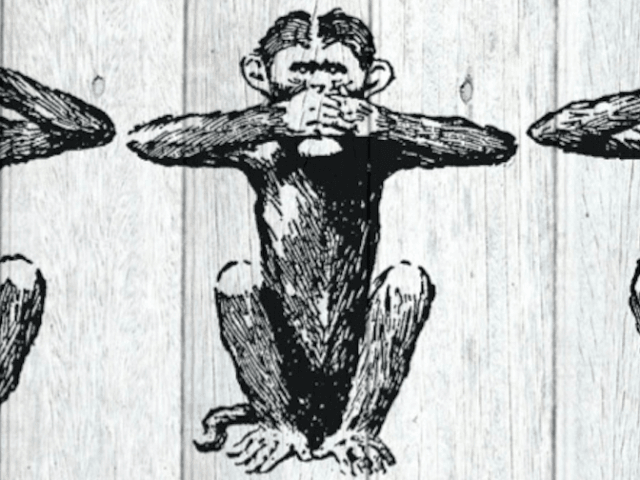“Once, the American Left told itself that it spoke truth to power,” Joel Pollak writes in his new book. “Today it cannot even speak the truth itself.”
The two sentences work as the thesis of See No Evil: 19 Hard Truths the Left Can’t Handle. The book, hitting store shelves in the midst of a presidential election debating the issues Pollak dissects within, arrives at an opportune time.
Each chapter opening includes a refutation, often aphoristic and occasionally just plain blunt, of the conventional wisdom of those disregarding common sense, e.g., “Only if we are willing to go to war can we have peace,” “The Constitution means what it says, and it was always meant to be a bulwark against the ‘transformation’ of our republic,” “Unless we can name and fight the enemy, we are condemned to lose,” etc. A more thorough rebuttal follows.
Two chapters, linked in exploring how people who accuse their enemies of waging war on science applaud their friends for waging war on science, stand out.
The LGBT movement, invested in a born-this-way narrative for decades, now argues that the biology that determines sexual orientation does not determine sex. Pollak gives a thumbnail sketch of gender controversies, including at his alma mater, Harvard, which jettisoned President Lawrence Summers after he recognized higher aptitude in the form of test scores partly explaining the male-female disparity in science, technology, engineering, and mathematics fields. The forced resignation illustrates a troubling theme of see-no-evil ideologues: when debate proves futile, silence the opposition. “Nature is ultimately stronger than convention,” Pollak writes, “and when our conventions no longer make room for our nature, other conventions—perhaps illiberal ones—become seductive.”
Like Pollak’s take on the two sexes (not, significantly, the 65 genders), the chapter on climate change reveals an open-minded scribe rather than a rigid ideologue. The author concedes that a rise in the earth’s surface temperature coincided with a rapid increase in carbon dioxide spewed into the atmosphere. But he notes that natural phenomena—“sunspots, geothermal activity, volcanic eruptions, and meteor impacts”—also influence the weather. Pollak seems open to persuasion on the question of global warming. His gripe concerns not merely proof but provability. The author notes Karl Popper’s rejection of ideas irrefutable through falsification as “science,” which describes the theories of environmental extremists who blame heat waves, hurricanes, and even snowstorms on global warming. The use of King Numbers, like the exclamation “science!,” used to silence dissenters strikes as self-contradiction. Science doesn’t become so by ballot. “Science is not subject to majority rule; if it were, scientific discovery would be rare, and meaningless,” Pollak points out. “Science is a method of inquiry, not a body of doctrine.”
Though the dustjacket advertises 19 gripes, the pages in between invariably return to one big one. Ideologues view their positions as articles of faith that require reflexive defense rather than as mere ideas subject to vetting, counterarguments, and critiques. Pollak, a walking advertisement of the power of an open mind as a Man-of-the-Left-turned-conservative, naturally finds this dogmatism—and the censorship and name-calling it unleashes—unnatural. While “conservative” certainly describes his outlook, Pollak, in refusing to take a boilerplate rightist position on everything and offering concessions that here and there the ideas pushed by the Left may contain merit, not only strengthens his overall argument but gives insight into why the problem of debate avoidance vexes the author so. He comes at his positions through logic, facts, reasoning, experience, observation, and other tools to discover truth rather ones designed to hide it through noise, distraction, and suppression. “Truths” that always work in our heads but forever fail outside of them need such artificial support.
“Today much of our political debate revolves around propositions—on climate change, minimum wage hikes, appeasing the Muslim world, and so on—that are never measured against reality,” See No Evil points out. “Under the influence of the repressive Left, we have developed the habit of judging political ideas not by whether they work in reality but by whether they exhibit the correct motivations.”
The message See No Evil: 19 Truths the Left Can’t Handle delivers to the subject of the book owes perhaps less to Karl Popper than Jack Nicholson: you can’t handle the truth. But like the realities laid out therein regarding the two sexes, the conflicts between justice and social justice, and a high minimum wage fostering lower employment, that’s a truth some people just can’t handle.

COMMENTS
Please let us know if you're having issues with commenting.